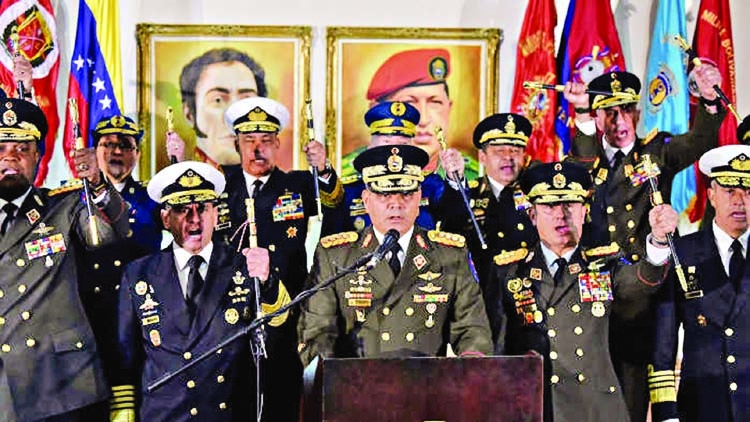Venezuela's senior military figures signal backing for Maduro

Senior figures in the Venezuelan military came out in support of President Nicolás Maduro on Thursday, a day after the US said it no longer recognized him as the country's leader and backed the opposition's Juan Guaidó instead.Vladimir Padrino López, a general and Venezuela's defence minister, said Maduro was the country's rightful leader and condemned what he described as Guaidó's unlawful attempt to wrest power from the socialist regime.
"The day before yesterday we saw a reprehensible event: a man proclaiming himself president," Padrino López said, referring to Wednesday's huge street protests in Caracas, during which Guaidó took a self-administered oath as Venezuela's interim leader. "That's a very serious matter." "We are here to avoid.?.?.?a conflict between Venezuelans," he said. "It is not a civil war that will solve Venezuela's problems. It is dialogue."
In a video posted on social media and broadcast on state TV, other senior military figures also backed Maduro, who has led the country since 2013 but has come under intense pressure to resign since he started his second term as president this month after an election victory widely dismissed as a fraud.
"The people of Venezuela, in a free and secret vote, elected Nicolás Maduro Moros as president," said Major General Manuel Bernal Martínez, head of the military in the west of the country. Backed by dozens of soldiers in olive green fatigues, other generals stepped forward and added their expressions of support for Maduro.
The declarations came after a day of high drama in which, one-by-one, many countries across the Americas turned their backs on Maduro and embraced Guaidó, the head of the National Assembly, or Congress - regarded widely as the last bastion of democracy in the country.
Donald Trump hailed Guaidó as the nation's leader, and other countries followed suit in what appeared to be a carefully synchronized move to undermine Maduro.
Venezuela has become increasingly militarized since Maduro's predecessor, Hugo Chávez, a former paratrooper, came to power 20 years ago, and the military's support could tip the balance of power between the two rival presidents. His regime is morally bankrupt, it is economically incompetent, and it is profoundly corrupt. It is undemocratic to the core
While the top brass of the military appears to be steadfast in its support for Mr Maduro, there are increasing signs of discontent among the lower ranks, where soldiers suffer the same deprivations as ordinary citizens. Earlier this week the government quashed a rebellion by 27 members of the Bolivarian National Guard - the military police force.
"It took the military several hours to express their support for Maduro after Guaidó designated himself president but they eventually came out with clear, if not exactly effusive, support," said David Smilde, an expert on Venezuela at Tulane University in the US.
"I think those hours after Guaidó's self-proclamation was the key test and Maduro got past that hump. However, his support from the military is clearly not airtight and that will be the key in the days and weeks ahead."
The Maduro government has warned the US of repercussions, saying that "things could happen" at the American embassy in Caracas. Maduro has given staff there 72 hours to leave the country, accusing the US of trying to foment a coup.
On Thursday evening the state department ordered non-emergency US government employees and their families to leave Venezuela. It also urged any US citizens in the country to "strongly consider departing".
Meanwhile, Maduro praised the military in a speech on Thursday to the Supreme Court, which is packed with his supporters, and mocked Guaidó and his backers as "a government of clowns".
Dressed in a suit and wearing the red, blue and yellow presidential sash, the 56-year-old looked relaxed and joked with his audience of magistrates. "I'm alive, thank God, and I will be for many years," he said. "I will never resign from a commitment to the country. Never, understand any circumstances."
Maduro said he had ordered the closure of the Venezuelan embassy in Washington and the withdraw of all diplomatic and consular staff from the US. "All this aggression comes from the Yankee empire," he said. The Venezuelan opposition, egged on by the Trump administration, was trying to drive the country towards "a state of madness, violence and chaos", he added.
Mike Pompeo, the US secretary of state, said Washington no longer recognized the Maduro regime. "The United States will take appropriate actions to hold accountable anyone who endangers the safety and security of our mission and its personnel," he said.
In remarks on Thursday to the Organization of American States, a diplomatic body comprising almost all the countries in the Americas, Pompeo again denounced Maduro: "His regime is morally bankrupt, it is economically incompetent, and it is profoundly corrupt. It is undemocratic to the core."
Foro Penal (Penal Forum), a Venezuelan non-governmental organization, said seven people have died this week in clashes between anti-government protesters and the security forces, and more than 200 were injured. Local media put the death toll as high as 16.
After Wednesday's drama, the streets of Caracas were relatively calm on Thursday, and Mr Guaidó kept a low profile. "We'll have to wait and see what happens. A lot of people are confused, and some are saying he's already gone into hiding," said 42-year-old Victor Oropeza in the Caracas neighbourhood of La Yaguara. The battle for power of the Venezuelan executive has split the world.
While the US and major Latin American nations including Brazil, Argentina and Colombia have backed Guaidó, Russia, China, Turkey and Mexico still regard Maduro as president. The US has requested a UN Security Council meeting on Saturday to discuss the "ongoing crisis" in Venezuela. Vladimir Putin, Russia's president, expressed support for Maduro in a phone call on Thursday, the Kremlin said, as well as his backing for a "peaceful dialogue".
